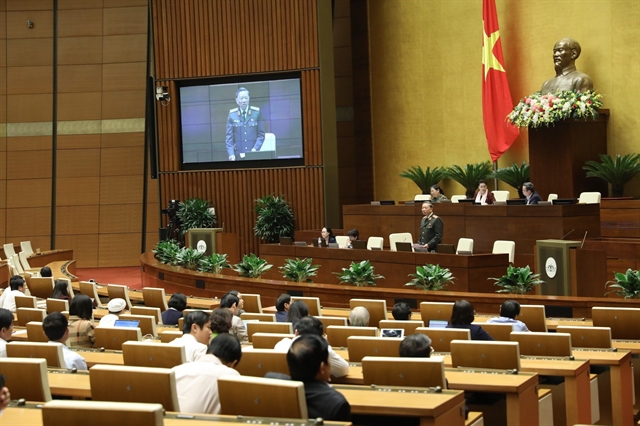 Politics & Law
Politics & Law


|
| National Assembly deputies discuss the draft revised Law on Drug Prevention and Control. — VNA/VNS Photo Văn Điệp |
HÀ NỘI — The National Assembly (NA) discussed the draft revised Law on Drug Prevention and Control during the plenary session on Friday morning.
The Law is currently built covering crime and drugs, control of legal drug-related activities, management of illegal users of drugs, drug addiction treatment, responsibilities of individuals, families, agencies and organisations, state management and international cooperation on drug prevention.
However, the practice of implementing the Law on Drug Prevention and Control in 2000, which was amended and supplemented in 2008, has revealed many limitations and shortcomings. Some current provisions of the law are inconsistent with the provisions of the Penal Code, the Criminal Procedure Code, the Law on Organisation of Criminal Investigation Agencies and the Law on Administrative Punishment that have been issued recently, affecting the effectiveness of drug prevention and control.
Due to the change of situation, a number of new social relationships have emerged related to drug prevention and combat but there is no law to regulate.
Confirming the need to develop and enact laws, NA deputies said formulation of the revised Law on Drug Prevention and Control must continue to improve to overcome problems, bringing into full play the synergy of the political system, agencies, organisations and individuals in drug prevention.
Deputies Nguyễn Ngọc Phương from Quảng Bình Province suggested clearer regulations in the draft law over the responsibility of parents to teach their children the dangers of drugs.
In addition, it is also necessary to reconsider the detoxification model at home because in the past, addicts have had violent episodes when trying to recover from drug problems with their families.
"I think, it is necessary to promote the detoxification model at centres, this is a safe and effective detoxification model", said Phương.
Deputies Nguyễn Thị Lệ Thủy from Bến Tre Province said it was necessary to diversify the types of detoxification so that drug addicts and their families have more choices and feel comfortable.
She also emphasised that this was the law on drug prevention and fight, but the main regulations are only against while the content on prevention was still limited. Therefore, the bill needs to strengthen the content of regulations on drug prevention.
Concerned about the current situation of high relapse rate, deputy Huỳnh Cao Nhất from Bình Định Province suggested the bill should have solutions to support, manage and supervise after detoxification more effectively. Especially, it is necessary to have livelihood support for people after detoxification as well as measures for people after detoxification to easily reintegrate into the community.
Deputy Mùa A Vàng from Điện Biên Province suggested the bill should have more strict sanctions against those who have hired other people to transport drugs.
“In fact, many people take advantage of people with little knowledge but poor, or people with difficult circumstances to transport drugs, many of these people are not aware that the work violating the law leading to violations,” he said.
Deputy Dương Tấn Quân from Bà Rịa-Vũng Tàu Province said that it was not advisable to set a deadline for drug addicts to kick the habit, because this was a chronic disease and addicts need support to successfully detox.
Deputy Phạm Thị Minh Hiền suggested that the agency in charge of drafting the bill should pay attention to reviewing words and avoiding words that were stigmatised and discriminatory against the addicts.
Emphasising the construction of the bill must really rely on all three pillars of reducing supply, demand and harm, deputy Nguyễn Thị Mai Hoa from Đồng Tháp Province said it was necessary to strengthen more regulations on coordination among core forces in drug prevention and control as well as effective implementation of management solutions of authorities, families and society for addicts post-detoxification. — VNS




